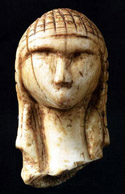Anthropology, Department of

Department of Anthropology: Faculty Publications
Document Type
Article
Date of this Version
Fall 1982
Abstract
Explanations offered by social scientists for the effects of father absence on children are reviewed; certain aspects of these interpretations are found wanting. Another explanation using theory from evolutionary biology is suggested: children show evolved, sensitive-period learning in early childhood which is linked to mother's pair-bond status or to mother's attitude toward males. As a result of children's perceptions a developmental track is established, which influences expression of reproductive strategy in adulthood. Male children born into matrifocal households exhibit at adolescence a complex of aggression, competition, low male parental investment, and derogation of females and feminity, while females show early expression of sexual interest and assumption of sexual activity, negative attitudes toward males, and poor ability to establish long-term relation- ships with one male. Male children reared in father9resent or nuclear households show less interest in competitive dominance with other males and more interest in manipulation of nonhuman aspects of the environment, while females show delayed sexual interest and activity and a mating strategy directed at locating a male who will invest in her and her offspring.


Comments
Published in Journal of Anthropological Research 38:3 (Fall 1982), pp. 255-273. Published by the University of New Mexico.